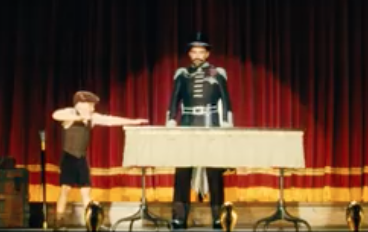Little Boy: Believe the Impossible
An interaction with issues raised by a Roman Catholic Film
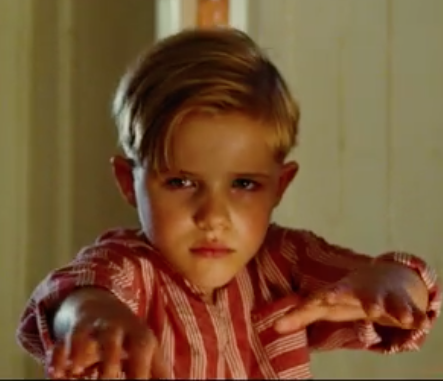 |
| Little Boy Trailer: http://littleboymovie.com/# |
—Jesus, Matthew 17:20b
Little Boy: Believe the Impossible, produced by Metanoia films (the biblical word metanoia means to change one’s mind or repentance, or perhaps in this instance, beyond the mind), tells the story of a young boy, Pepper Flynt Busbee, upon whom psychokinetic power was bestowed to work miracles of faith, even shake mountains. Despite being bullied by other kids, the “little boy” believed the impossible. By believing in the power of faith without doubting he was not only able to perform supernatural feats that astonished the townspeople, but also bring his father and best friend, James Busbee, back from the battlefields and perils of World War II. As one promo puts it,
The movie tells an all-American story of a devoted 7-year-old son whose father goes missing in the battles of World War II. Motivated by Jesus’ words that faith can move mountains, the little boy asks a local priest how he can increase his faith to move a mountain and bring his missing daddy home. The film promises to be a heart moving film.[1]
The executive producer (other of the film’s execs include Roma Downey and Mark Burnett) and actor Eduardo Verástegui* asks of the film’s storyline, “Who is going to be against a little boy who is going to do whatever it takes to bring his dad back from World War II, because he loves him so much he wants to save his dad, and he’s going to do it through a list of actions [Acts of Corporal Mercy] that are universal—feed the poor, visit those who are sick and in prison?”[2] So a trap has been set. Who will dare to criticize a movie that brings people together and unites them to do good to other people? And didn’t Jesus warn His followers against causing “one of these little ones” to stumble?
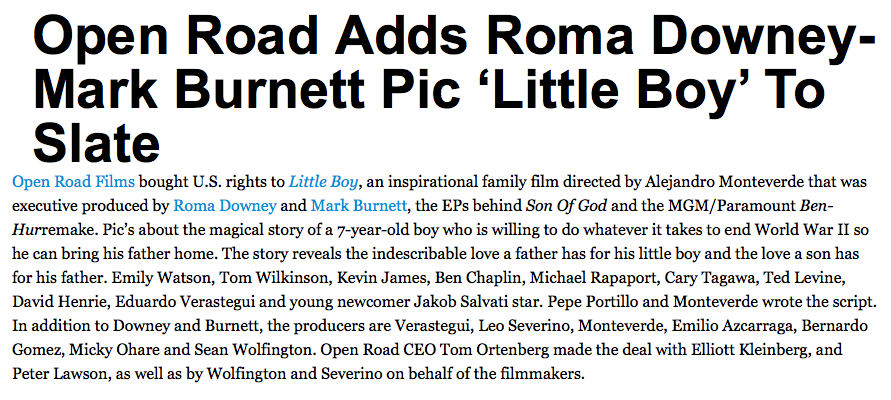 |
| (Source) |
No doubt the film, by creating the cinematographic feeling of a Norman Rockwell painting and departing from the standard Hollywood fare of sex and gore, will appear as a harmless and innocent fantasy to most viewers. The nostalgia for a long-gone era of American history, vaguely remembered by some of us seniors, will draw the hearts of many viewers into the story. Those who have seen the movie testify to its emotional appeal, and emotions are for most Americans the spiritual gateway to the soul.
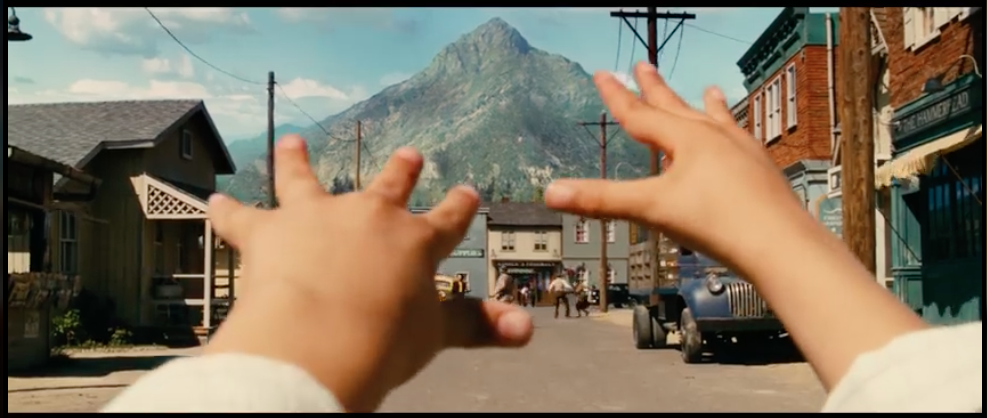 |
| Little Boy moving a mountain, Trailer: http://littleboymovie.com/# |
The stimulus for making the movie may arise from the director and producers’ desire to influence American culture for the good. One of the 7 Mountains Christian Dominionism aspires to conquer is the media, arts and entertainment industries. Some pre-release reviews of the movie have already praised Little Boy as an artful film though criticizing it for, among a few other things, depicting war violence and hatred of the Japanese.
Though containing elements of goodness in it, the “spirituality” the movie portrays ought to concern biblical Christians. The movie contains a weird spiritual combination of themes that while admittedly Christian, also projects a magical and occult worldview like a Harry Potter movie. We turn now to a description and transcript of the movie’s trailer. As you read it, note the occurrences of the words “believe” and “faith.”
Trailer Scenes[3]
- On the family farm:
Father: “Do you believe we can do this?”
Little Boy: “Yes, I believe we can do this!”
- Crossing an ocean in a fierce life-threatening storm (a dream?):
Ship’s Captain: “Partner, do you believe you can do this?”
Little Boy: “I believe I can do this!”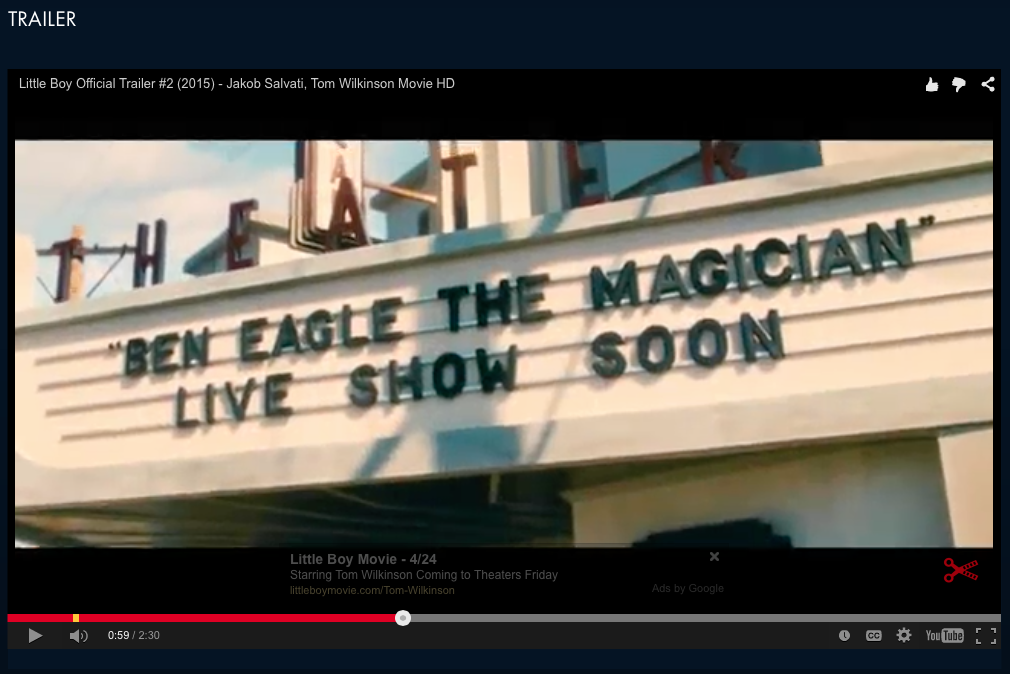
Magician show in Little Boy: http://www.littleboyresources.com/trailer
- Attending a magic show:
The marquee on the town theater reads—“Ben Eagle the Magician” Live Show Soon
Ben Eagle, the costumed and goateed magician with dark piercing eyes looks at the audience of children and says: “The moment of truth. I am searching for the chosen one.”
Chorus of audience’s kids shouting: “Me . . . me . . . me.”
Ben Eagle pointing his magic wand at the little boy: “You!”
(After embarrassingly slinking down into his seat, the Little Boy raises the courage to step up to the stage and sit at the end of a long table opposite from the magician. By the magician, the table has a pop bottle on it.)
Ben Eagle to the Little Boy: “The movement of an object through inner power. Do you believe you can do this?”
Audience of youngsters: A chorus of mocking laughter at the Little Boy.
Little Boy to Ben Eagle: “Yes, I believe I can move it!”
(The Little Boy stretches his arms from his body and points a hand at the bottle. From the other end of the table the bottle slides across the table to him.)
Audience of little children: They clap and cheer for what they have seen.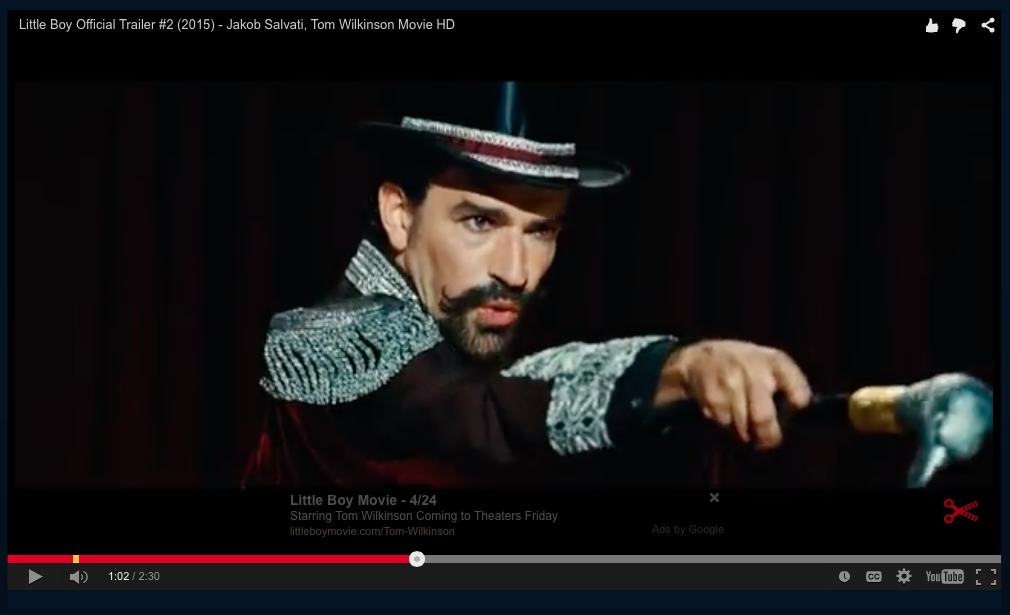
The Magician in Little Boy: http://www.littleboyresources.com/trailer
- Counsel from a priest in his office:
Priest: “You wanted the bottle to move so much, it moved. Faith is (indistinct).”
Little Boy: “But if I get enough faith nothing is impossible, right? Even bringing my dad home?”
Priest: “Your faith won’t work if you have even the slightest bit of doubt.”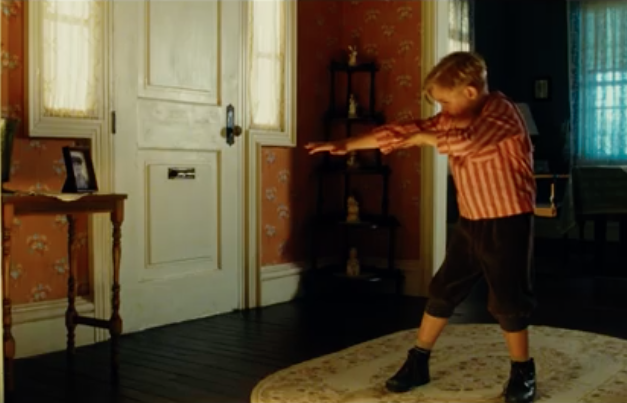
Note the posture. Little Boy must wield faith like Yoda does
with “The Force” in Star Wars. http://littleboymovie.com/#
- On Main Street (arguing with older brother):
Little Boy: (Yelling indistinct words).
Big Brother: “How? How are you going to bring Dad back?”
Little Boy: “I can move a mountain.”
Big Brother: (Taking the Little Boy to the middle of the street and turning him in the direction of the distant overlooking mountain) “Want ’a move a mountain? There’s one. Go ahead. Move it.
Little Boy: (Assuming a stance of faith—one foot forward and the other planted behind) He points his arms, hands and fingers at the mountain as he stares the mountain down. The earth quakes and cracks beneath his feet. The mountain moves. A chandelier falls from a ceiling. Bystanders “Ooh . . .” and “Ah . . .” as they are amazed at the powers of faith emanating from the hands, posture and countenance of the Little Boy.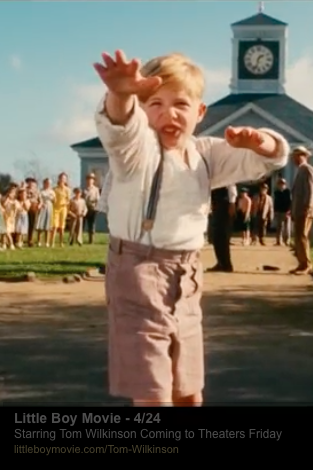
http://littleboymovie.com/#
- Ladies and Nun in church (feeling the earthquake):
Lady: Wow! Was that an earthquake?
Nun: “It’s a miracle!”
- Override message: “It’s up to you (the movie’s viewers?) to achieve the impossible.”
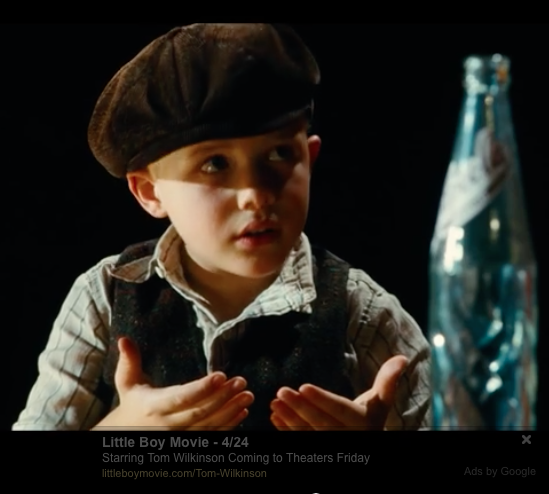 |
| Little Boy after a session with the magician: http://www.littleboyresources.com/trailer |
- Override
voice (divine?) speaks to the Little Boy: “It takes courage to believe.
Your father (God?) would be more than proud of you.”
So briefly, allow a few concerns about the worldview this movie’s trailer presents to be addressed.
Faith
Little Boy: “But if I get enough faith nothing is impossible, right?”
Priest: “Your faith won’t work if you have even the slightest bit of doubt.”
On three occasions to His disciple-apostles, Jesus stated that faith could move a mountain (Matthew 17:20; 21:21; Mark 11:23), a fig tree (Matthew 21:21), or mulberry tree (Luke 17:6). He did not utter the words regarding the power of faith to a “little boy,” or for that matter other children (though in Matthew 18 the Lord lauds children and warns of adults who might cause them to stumble in unbelief), but to grown men, to His disciple-apostles.
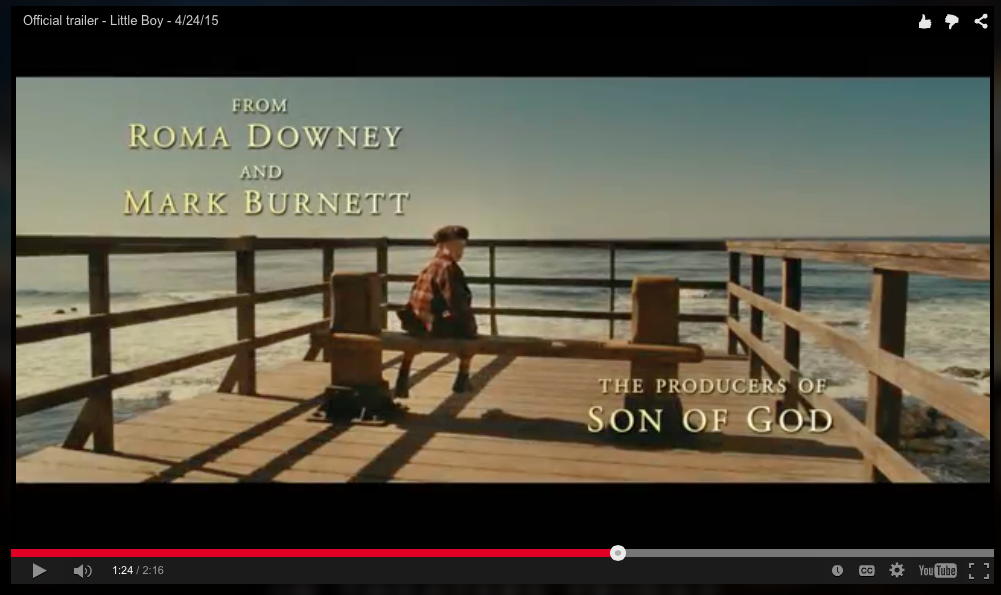 |
| http://littleboymovie.com/# |
Faith and Miracles
In the instance where Jesus spoke about mountain-moving faith, a father had brought his son to some of the disciple-apostles to be cured of demon possession (Matthew 17:14-20). (Peter, James and John had been with Him on the Mount of Transfiguration.) The disciples could not rid the boy of his demonic affliction, despite having been given the kingdom power to do so (Matthew 10:7-8). So desperate to see his son cured of demon possession, the man brought the boy to Jesus. Jesus rebuked the demon and cured the youth (Matthew 17:18). The occasion for Jesus’ teaching on faith in this context was to account for the disciples’ inability. Their inability to cure the demon possessed boy caused the disciples to question whether their kingdom powers were legitimate and sufficient to do what Jesus had told them they could. We pick up the dialog between Jesus and His disciples as He explained why they could not exorcise the demon out of the man’s son. Note: Jesus’ words, as indicated by the plural pronouns and verbs, were addressed to twelve grown men, not one little boy.
Question of the Disciples:
“Then the disciples came to Jesus privately and said, ‘Why could we not drive it out?’”
Answer of Jesus:
“He [Jesus] said to them (Greek plural pronoun, autois)”
“Because of the littleness of your (Greek plural possessive pronoun, humon) faith”
“truly I say to you (Greek plural pronoun, hymin)”
“if you (Greek plural pronoun, hymeis) have (Greek plural verb, echete) faith”
“you will say (Greek plural verb, eirete) to this mountain”
“nothing will be impossible to you (Greek plural pronoun, hymin)”
In His explanation about mountain-shaking faith, Jesus was not speaking to children, but to grown men (Matthew 17:19-20). Though He did talk about children in the next chapter (Matthew 18:1-6), in the immediate context Jesus was addressing the disciple-apostles, not little boys. Furthermore, contradicting the little boy’s assumption (“if I get enough faith nothing is impossible”) and the priest’s counsel (“your faith won’t work if you have even the slightest bit of doubt”); Jesus told these “big men” that all they needed was “little faith” to move a big mountain, i.e. mustard-seed-sized faith. Putting aside the fact that Jesus probably employed a proverbial and hyperbolic expression used by Jewish rabbis to describe possible but improbable occurrences,[4] He was telling “grown” men that they could perform “big” miracles by exercising “little” faith. He was not telling “little” boys they needed “big” faith to work kingdom signs.
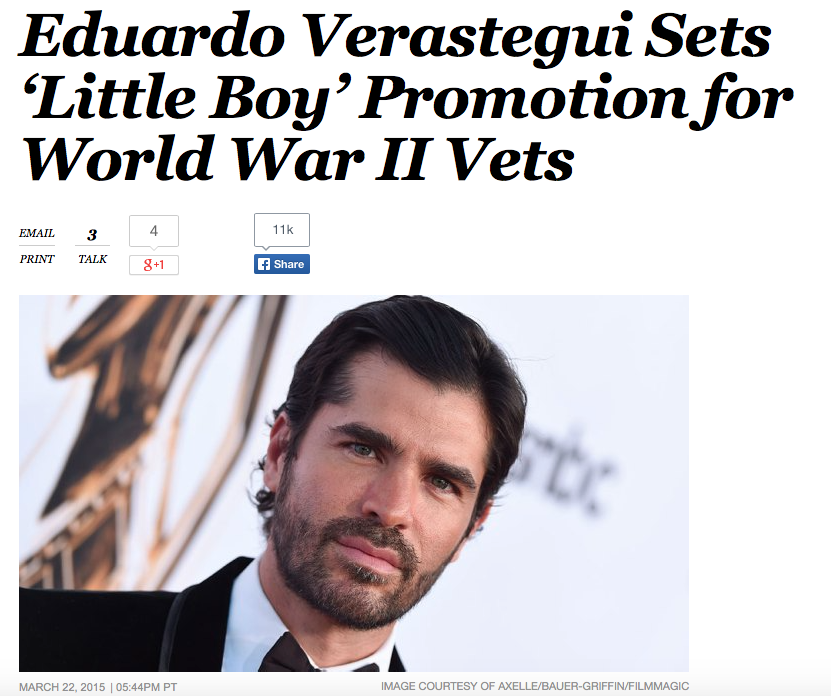 |
| Variety promo for Little Boy HERE. Veterans are a targeted audience. |
Lesson: In another analogous context regarding the relation of faith to the supernatural, Jesus told the disciple-apostles, “Have faith in God” (Mark 11:22). The discretionary power to work miracles belongs to God, and to that end Jesus said that “mustard-seed faith” can dispose God to do miracles and exorcisms. So what is this Charismatic assumption that healing miracles depend upon the amount of faith either the healer or healee can conjure up? As commentator R.T. France (1938-2012) wrote, “It is important to observe here that it is not the ‘amount’ of faith which brings the impossible within reach, but the power of God, which is available to even the ‘smallest’ faith.”[5] This fact about faith is far different from its portrayal in Little Boy. It’s not big faith that causes God to respond, but little faith.
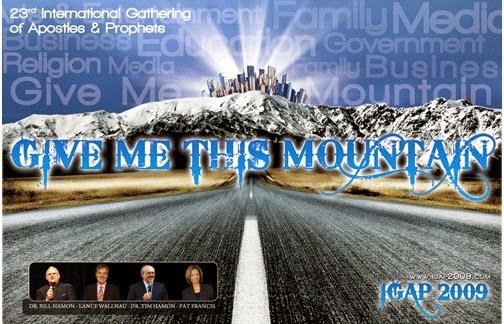 |
| The New Apostolic Reformation also wants to move mountains. Ad on TheElijahList, 7/18/09, url was HERE. |
Faith and Works
Not only does little faith endow the faithful to perform big miracles, but also to do Corporal Works of Mercy. Though with the exception of caring for bodies of the dead (i.e., “corporal” means body), these acts of mercy are derived from Jesus’ teaching about the coming judgment: “Truly I say to you, to the extent that you did it to one of these brothers of Mine, even the least of them, you did it to Me.” (Matthew 25:34-*40). So according to Roman Catholic tradition, these works are defined as “feeding the hungry, giving drink to the thirsty, clothing the naked, sheltering the homeless, visiting the sick, visiting the imprisoned and burying the dead.”[6] The seventh and last work of mercy, burying a dead person’s body, is evidently added in “deference to the body’s being the ‘temple of the Holy Spirit’ (1 Cor 3:16).”[7] And as there are seven corporal works of mercy, so also there are seven Roman Catholic spiritual works of mercy.[8] Because of the power of emotions, one of the movie’s agenda is probably the hope that viewers will commit to imitate what they saw and leave the theater like they might on occasion leave church: to engage the to-do-list of Little Boy and make this world a better place.
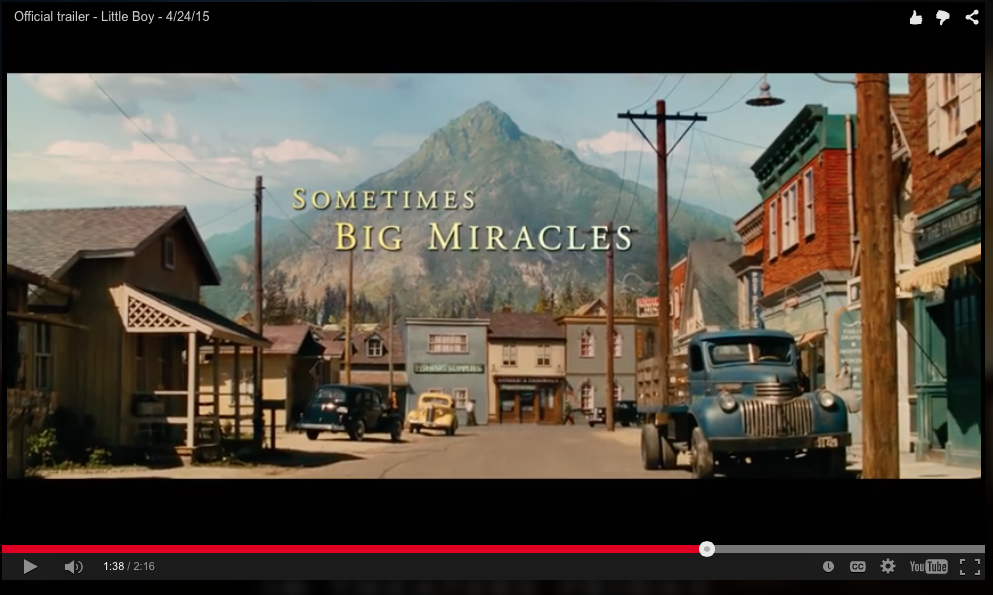 |
| http://littleboymovie.com/# |
Corporal Acts of Mercy are great, but only insofar as they go. The issue of the relation of works to faith is addressed by James in his epistle. Faith without works is dead, as is the corollary, works without faith is also dead (James 2:17; See 1 John 3:17-18). One cannot read the Old Testament without being gripped by God’s concern for the poor. And who hasn’t heard about the Parable of the Good Samaritan? (Luke 10:30-37) Christians do have an obligation to help people cope with this life’s physical needs. Hundreds of times as a pastor, and even now in retirement, I have helped homeless people or needy families pay for food, clothing, gas, utilities, etc. [9] All of us should cause us to look kindly and act benevolently toward organizations like Samaritan’s Purse and local rescue missions. But having said this, absent a Gospel testimony along with benevolence leaves a person no better off. Corporal Acts of Mercy may minister to people’s immediate needs, but they will not solve their ultimate need; and that is to be redeemed by believing that Jesus died for our sins and was raised for our justification (Mark 10:45; 1 Corinthians 15:3-4).
Look . . . if we’re going to believe the importance of acts of mercy based upon the words of Jesus of Jesus, then we had better also embrace the message of salvation based upon the words of Jesus and His appointed ambassadors, the apostles. What the Word has joined together no “do-gooder” should dare to separate. Liberal Christians are good at promoting doing good works while at the same time they are embarrassed by the simplicity and exclusivity of the Gospel (Revelation 3:1-6). Though not embarrassed by the Gospel, some fundamental Christians (Note: I say some because the rescue mission movement was initiated by fundamentalists.) do not always do works to help the needy out. God calls Christians to do acts of mercy while at the same time being bold to preach the Gospel. Jesus was bold for both, and so should we. But amidst all this, it should be noted that “Acts of Corporeal Mercy” is a distinctly, though not necessarily unbiblical, Roman Catholic categorization, as are other emphases in the movie Little Boy.
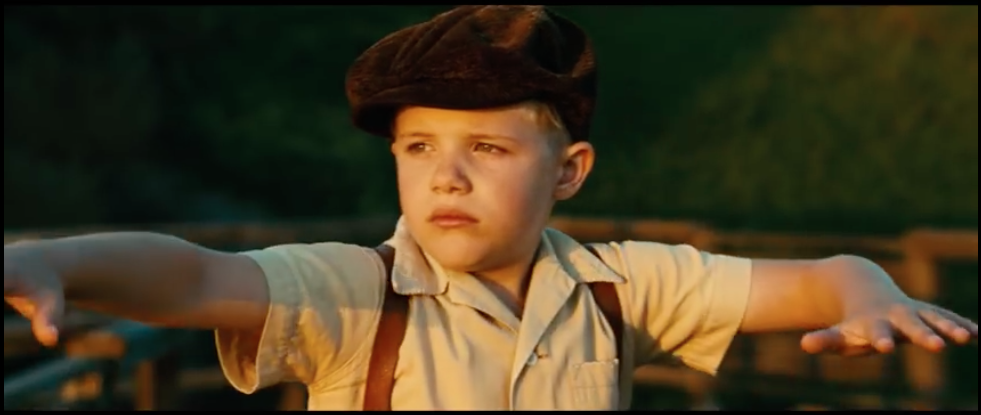 |
| http://littleboymovie.com/# |
Nevertheless, the movie’s trailer presents faith as the activator by which quantum powers of energy, sound, light, vibrations can be personally harnessed, powers like those communicated by the various authors of The Physics of Heaven. Little Boy demonstrates how a kid can activate such powers by faith and by performing Corporeal Acts of Mercy, bring God’s kingdom to earth. As the override voice tells the viewers, “It’s up to you to achieve the impossible.” Having said this, the movie also raises issues regarding the little boy’s mission. Is it messianic?
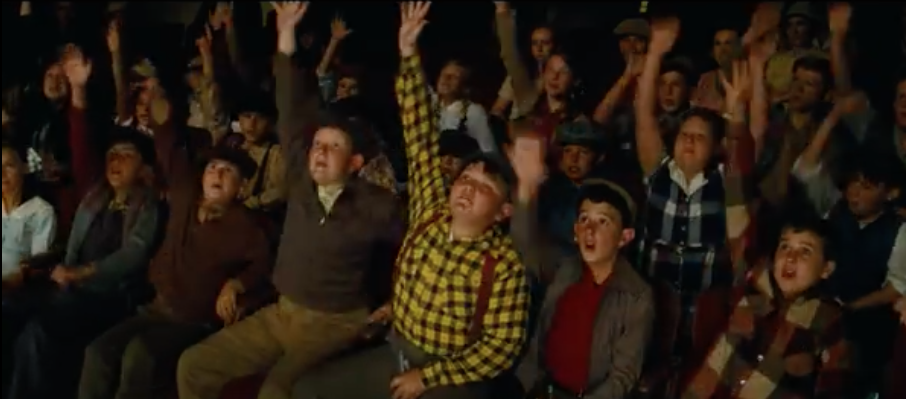 |
| Children in magician’s audience wanting to be “the chosen one.” http://littleboymovie.com/# |
The Chosen One
Ben Eagle the magician: “The moment of truth. I am searching for the chosen one.”
Kids in chorus shouting: “Me . . . me . . . me.”
Ben Eagle pointing his magic wand at the Little Boy: “You!”
With the magician serving as a sort of conduit to bestow supernatural power, did he announce the appointment of the “little boy” to be a messiah? Or, if measured by his ability to work signs, did the magician reveal the boy to be a “manifest son of God”? Does the Little Boy portray what Charismatics believe becoming a member of Joel’s Army looks like?[10] Ironically, the designation “chosen one” introduces the doctrine of election.
On the point of a young messiah working wonders, it can be noted that ancient Apocryphal gospels (though removed a hundred years or so from the time Jesus lived) invented stories of the boy Jesus performing miracles between the ages of five and twelve years old—raising a controversy by fashioning five sparrows from clay while playing with other children on the Sabbath; resurrecting a playmate from the dead who had fallen off a roof; healing a young man who had seriously wounded his foot with an axe while splitting wood; etc.[11] On this point, the movie plays upon the apocryphal traditions of the child Jesus working miracles.
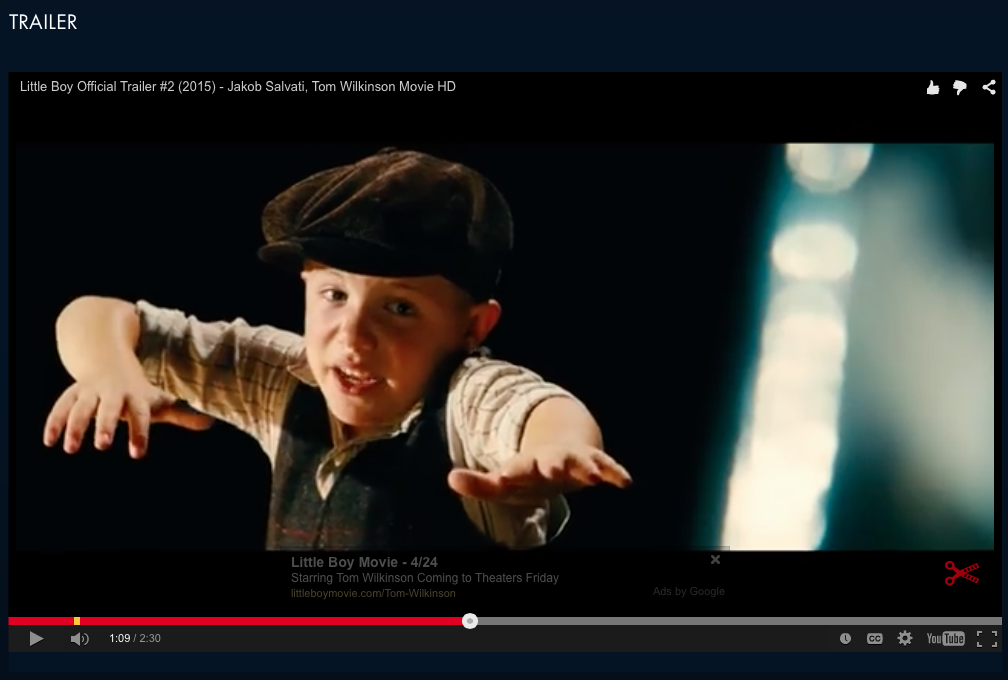 |
| http://www.littleboyresources.com/trailer |
In contrast to the relative silence of the Gospels regarding Jesus’ childhood days and despite the Gospel notice that His first miracle was performed at the Wedding Feast at Cana of Galilee (changing water into wine, John 2:11), these fictions were invented to fill in biographical “gaps.” As regards these invented stories, Alfred Edersheim (1825-1889) wisely stated that the silence of the Gospels (Matthew, Mark, Luke and John) stands “in contrast to the almost blasphemous absurdities of the Apocryphal Gospels, [and] teaches us once more, and most impressively, that the Gospels furnish a history of the Savior, not a biography of Jesus of Nazareth.”[12] In contrast to Apocryphal gospels, Luke reported of Jesus’ growing-up, of the supposedly lost years of Jesus, that “The Child continued to grow and become strong, increasing in wisdom; and the grace of God was upon Him (Luke 2:40; See also Luke 2:52). It was not until His baptism that the Holy Spirit descended upon Jesus and public notice was given that He was commencing His public ministry which included the Spirit’s empowerment to work “signs and wonders” (Matthew 3:13-17; 12:24, 28, 31-32). This Gospel fact debunks the idea that in His youth Jesus performed miracles. While as a mature man Jesus became a “wonder worker,” He was not seen by His contemporaries as a “wonder boy,” the one exception being His dialoging with the teachers in the temple when He was twelve years old (Luke 2:41-52).
So the question becomes, why did the magician choose this little boy? In contrast to the magician and as chronicled by Matthew, Jesus said: “Suffer little children, and forbid them not, to come unto me: for of such is the kingdom of heaven” (Matthew 19:14, KJV). But Ben Eagle the magician, mixing faith and power, gave psychokinetic or telekinetic powers to the little boy only.
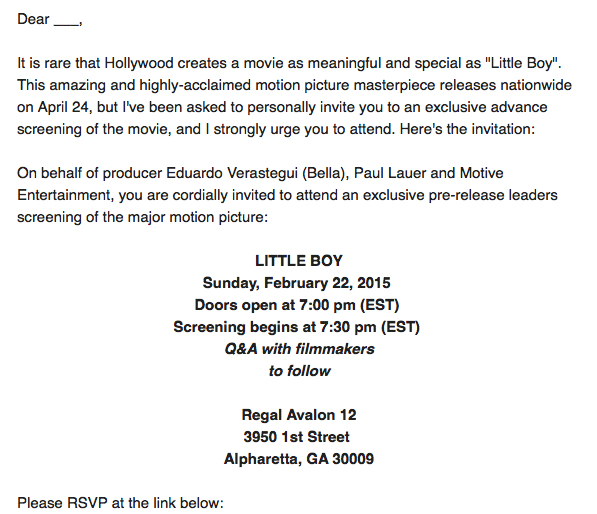 |
| E-mail promotion of advance screening of Little Boy from Paul Lauer, dated 2/17/15 |
Occult Powers
Magician to the Little Boy: “The movement of an object (i.e., the bottle on the table) through inner power. Do you believe you can do this?”
Little Boy to magician: “Yes, I believe I can move it!”
(The bottle slides from one of the table to the other)
Little Boy moving the bottle, http://littleboymovie.com/#
Psychokinesis derives from root psyche referring to the mind or soul, and kenesis meaning energy or movement. Hence psychokinesis (often designated PK) refers to the power of the mind to affect the material world, i.e. mind over matter. Often PK is used to explain “miracles or the actions of spirits.”[13] Leonard George refers to the book of Fr. Herbert Thurston (1856-1939), The Physical Phenomena of Mysticism, which presents a “collection of strange phenomena associated with Catholic saints.” George then states that,
Thurston reported many incidents in which the holy wafer of the Mass allegedly rose from the altar and deposited itself into the mouth of the communicant. The devout may consider such an event to be a divine act; but some have argued that it would more likely be caused by PK on the part of the priest or the communicant.[15]
Though beautifully produced, Little Boy will emotively introduce viewers of all ages to the weird world of the occult, something the Bible expressly first forbade Israel and now forbids the church to dabble in (Deuteronomy 18:9-15). Remember, George stated that psycho or telekinesis is often used to explain the actions of spirits. And Christians are at war the devil and unclean spirits who reign in the occult domain (Ephesians 6:10-17).
 |
| Greg Reid’s booklet critiquing Roma Downey. Read more HERE and HERE. |
Conclusion
Little Boy is a film containing overtures pointing to Roman Catholicism. The movie seemingly fails, based upon the material of the trailer, to integrate its themes faith, power, miracles and good works in a biblical way. In fact, the ways in which the themes are presented are anti-biblical. The introduction of occultism by the movie is wholly unacceptable to Bible believing Christians. Occult themes cannot be soft pedaled by calling them magic as other reviewers have done. The Bible teaches the faithful to avoid the occult. Even though the review does not use the word occult with all its sinister connotation, I agree with the assessment of the movie given by the Family Guide to Movies and Entertainment: “LITTLE BOY is a beautifully photographed, artistic piece of magical realism, but the movie’s overt Christian, redemptive, moral elements are diminished by too much magical thinking.”[16]
Endnotes:
1. Drew Zahn, “Major movie inspires faith to move mountains,” World Net Daily, March 3, 2015 (http://mobile.wnd.com/2015/03/major-movie-inspires-faith-to-move-mountains/). Producer calls ‘Little Boy’ ‘a fairy tale for adults through the eyes of a child’.
2. Verástegui quoted by Zahn, World Net Daily. “Acts of Corporeal Mercy” (apart from a Roman Catholic interpretation, see endnote 6) may be understood perhaps like this: Christians serve as conduits for God’s good works as part of the Body (i.e., Latin, corpus) of Christ. The works of mercy they do to others is if they had done them to Christ (See Matthew 25:34-*40.). The idea is that good works to the bodies of the needy come from the Body of Christ.
3. Little Boy: Believe the Impossible trailer can be seen here: http://littleboymovie.com/#. Note that there are other trailers, including this link: http://www.littleboyresources.com/trailer
4. See Donald Hagner, Matthew 14-28: Word Biblical Commentary, Volume 33B (Dallas, TX: Word Incorporated, 1995): 505.
5. R.T. France, The Gospel According to Matthew: An Introduction and Commentary (Grand Rapids, MI: William B. Eerdmans Publishing Company, 1985): 266.
6. “Corporal Works of Mercy,” Our Sunday Visitor’s Catholic Encyclopedia, Reverend Peter M.J. Stravinskas, Ph.D., S.T.L., Editor (Huntington, IN: Our Sunday Visitor Publishing Division, 1991): 265. I thank researcher Sue Conway for providing this quote. See: http://www.catholicworker.org/aimsandmeanstext.cfm?Number=28
7. Ibid.
8. Ibid.
9. I relate this reluctantly to avoid the accusation that I have not and do not care about the plight of the needy. See Matthew 6:1-2; 23:5
10. See Sarah Leslie, “The NEW BREED Defined,” Herescope, February 3, 2006 (https://herescope.net/2006/02/new-breed-defined.html); “The New Breed and Incarnating Christ,” Herescope, February 8, 2006 (https://herescope.net/2006/02/new-breed-and-incarnating-christ.html); “IHOP’s New Breed Leaders,” Herescope, July 16, 2011 (https://herescope.net/2011/07/ihops-new-breed-leaders.html); and Jewel Grewe, Joel’s Army (West Lafayette, IN: Discernment Ministries, Inc., 2006). PDF download available: http://discernment-ministries.org/JoelsArmy.pdf. The idea current among NAR Charismatics is that at the end of this age God is going to raise-up youth to defeat godlessness in the world, thereby helping to establish and administer God’s kingdom on earth. They find precedent for this from the Prophet Joel, “And it shall come to pass afterward, that I will pour out my spirit upon all flesh; and your sons and your daughters shall prophesy, your old men shall dream dreams, your young men shall see visions” (and work signs and wonders?, Joel 2:28, KJV). Never mind that the prediction-promise was addressed to the Jewish nation, not the contemporary church.
11. See Oscar Cullman, “Infancy Gospels,” New Testament Apocrypha, Volume One: Gospels and Related Writings, Revised Edition, Wilhelm Schneemelcher Editor, R. McL. Wilson, English Translator (Louisville, KY, Westminster John Knox Press, 1991): 414-469.
12. Alfred Edersheim, The Life and Times of Jesus the Messiah, New Updated Edition (Peabody, MA: Hendrickson Publishers, 1993): 154.
13. Emphasis added, Leonard George, Alternative Realities: The Paranormal, the Mystic and the Transcendent in Human Experience (New York, NY: Facts On File, Inc., 1995): 234.
14. Ibid. Thurston was a Roman Catholic priest of the Jesuit order, a prolific scholar, and an expert on spiritualism.
15. Ibid: 234-235.
16. “LITTLE BOY: Faith Marred by Magical Realism,” Movie Guide: The Family Guide to Movies and Entertainment (https://www.movieguide.org/reviews/little-boy.html).
*Note that the Executive Producer of Little Boy, Eduardo Verastegui, was listed as an Honorary Co-Chair at Texas Gov. Rick Perry’s NAR and IHOP-sponsored event in 2010 called “The Response,” The original url with Verastegui’s name listed was here: http://theresponseusa.com/honorary-co-chairs.php but was archived by Talk to Action here: http://www.talk2action.org/story/2011/9/13/16346/7939/Diary/Wiped_quot_The_Response_quot_website_material. This significant event was written about extensively on the Herescope blog including such articles as: “IHOP & the NAR,” July 12, 2011 (https://herescope.net/2011/07/ihop-nar.html); “IHOP Enters Dominion/Christian Right Politics,” July 1, 2011, (https://herescope.net/2011/07/ihop-enters-dominionchristian-right.html); “C. Peter Wagner Spins the NAR,” August 22, 2011 (https://herescope.net/2011/08/c-peter-wagner-spins-nar.html); “IHOP: International House of Political Action,” July 4, 2011 (https://herescope.net/2011/07/ihop-international-house-of-political.html) and “IHOP Enters Dominion/Christian Right Politics,” July 01. 2011 (https://herescope.net/2011/07/ihop-enters-dominionchristian-right.html).


